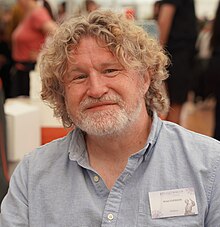|
Brian Evenson
Brian Evenson (born August 12, 1966) is an American academic and writer of both literary fiction and popular fiction, some of the latter being published under B. K. Evenson.[1] His fiction is often described as literary minimalism, but also draws inspiration from horror, weird fiction, detective fiction, science fiction and continental philosophy. Evenson makes frequent use of dark humor and often features characters struggling with the limits and consequences of knowledge. He has also written non-fiction, and translated several books by French-language writers into English. Since 2016 he has taught in the School of Critical Studies at the California Institute of the Arts, both in the Creative Writing MFA program and in the Aesthetics and Politics MA Program. BiographyBrian Evenson was born August 12, 1966, in Ames, Iowa.[2] His father, William Evenson, was a longtime professor of physics at Brigham Young University (BYU) and later an administrator at the same school.[3] As a young man, Brian Evenson served a two-year mission for the Church of Jesus Christ of Latter-day Saints (LDS Church) in France and Switzerland.[1] He received degrees from BYU (BA) and the University of Washington (MA and PhD). After leaving a teaching position at BYU, he held positions at Oklahoma State University, Syracuse University, and the University of Denver before being hired at Brown University. He was Professor of Literary Arts at Brown from 2003 to 2015.[4] BYU controversyWhile teaching at BYU, Evenson was involved in a controversy surrounding his first book Altmann's Tongue (1994).[5] While a new professor of creative writing at Brigham Young University (BYU), Brian Evenson published Altmann's Tongue, which included scenes of violence such as characters who are forced to eat mutilated tongues and who attempt to cut off their own limbs.[6] Evenson stated that his book contract was a "significant factor" in his being hired, and he included some stories from the collection in his application.[3] A graduate student complained anonymously to church leaders that the work promoted the "enjoyment" of violence, while Evenson argued that his fiction accentuated violence to show its horror and "thus allow it to be condemned."[6] A senior faculty member planned to tell church authorities that Evenson knew that future, similar publications would "bring repercussions," even though Evenson had not said this.[3] Evenson resigned from BYU in 1995, and left the church formally in 2000.[6] His case, along with others, was included in a report by the American Association of University Professors, which argued that academic freedom was stifled at BYU.[3] Writing style and influencesEvenson's Ph.D. is in both literature and critical theory, and his work is subtly philosophical, particularly influenced by continental philosophy. Many of Evenson's recurrent themes of virtuality and "sensation" being traceable to Deleuze & Guattari's Capitalism and Schizophrenia. Altmann's Tongue opened with an epigraph by Julia Kristeva; Dark Property featured quotes in untranslated German from Martin Heidegger; and several of Evenson's books have epigraphs from philosopher Alphonso Lingis. However, Evenson has stated that he intends any philosophical elements to be fully integrated into his fiction rather than promoting any particular viewpoint, and has argued that reading philosophical works directly is more rewarding than reading philosophy that is veiled as fiction.[7] Some of Evenson's work explores his Mormon heritage, often from a critical perspective or examining controversial subject matter. For example, the main character of The Open Curtain (2006) becomes preoccupied with a murder committed in the early 1900s by William Hooper Young, a grandson of 19th-century Mormon leader Brigham Young, while Immobility (2012) takes place in a post-apocalyptic Utah and features some esoteric elements of LDS theology. Nonetheless, Evenson has asserted that he maintains a measure of respect for devout believers in the LDS Church and does not intend to casually offend or provoke them.[8] Evenson's work has been compared to that of J. G. Ballard, Jorge Luis Borges, Paul Bowles, Franz Kafka, William S. Burroughs, Cormac McCarthy, Robert Coover and Edgar Allan Poe (among others).[9] Evenson has expressed admiration for horror novelist Peter Straub,[8] and for crime fiction in the hardboiled genre, both past masters like Dashiell Hammett and Jim Thompson,[10] and contemporary practitioners like Andrew Vachss.[11] Awards
BibliographyWorks of fiction
Works of non-fiction
Works of translation
Recordings
References
External links
|
||||||||||||||||||
